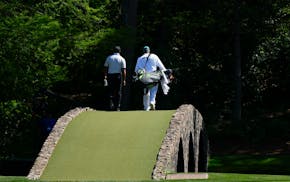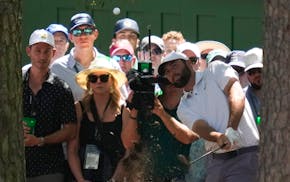The Wilfs' reluctance to reward Leslie Frazier with a long-term contract extension last week was surprising. They have made impulsive moves in the past, and picking up Frazier's option instead of lavishly rewarding him for a remarkable season smacked of patience, even wisdom.
Perhaps the move seemed startling because the Vikings last season became the rare success story in a period of failure for Twin Cities sports teams. In a metropolis that has seen Tom Kelly, Ron Gardenhire, Jacques Lemaire, Clem Haskins, Bud Grant and Flip Saunders become fixtures in their jobs, perhaps never before have the futures of the local coaches and manager seemed so uncertain.
Here's one view of where each major-revenue sport coach or manager stands:
The coach: Leslie Frazier
The situation: The Wilfs extended Brad Childress' contract in November 2009 and fired him in November 2010. They may have stumbled across a management philosophy I first heard from Andy MacPhail when the Twins were baseball's model franchise in the early 1990s: Never make a decision before you have to.
Frazier appears to be building a sustainable winner, but he and his agent agreed to a contract that featured a team option. The Wilfs are wise to avoid making a long-term commitment before required to do so.
What he needs to do: Get more out of the quarterback position and passing game. Long-term NFL coaches all develop or find a quarterback who defines their tenure.
The coach: Jerry Kill
The situation: He has a long-term contract, he works more cheaply than most of his peers, and he's worked hard behind the scenes to convince the U's power brokers that he will require plenty of time to turn around the Gophers football program.
He may have more job security than other local coaches because of the lack of expectations surrounding his program. That's right, the local coach with the most job security has a conference record of 4-12 and has suffered a series of seizures.
What he needs to do: Show any sign of progress and remain relatively healthy, and he's safe.
The coach: Mike Yeo
The situation: I wrote two weeks ago that heightened expectations, and the specter of his team's collapse last season would make Yeo vulnerable if he couldn't rally the Wild.
For the short term, he has. The team has surged the past two weeks, and Yeo deserves credit for that.
The Wild remains one of the lowest-scoring teams in the league, and Yeo will be challenged to incorporate the organization's best young players into the lineup during a short, tightly scheduled season.
What he needs to do: Make the playoffs, or owner Craig Leipold might find 196 million reasons to make a change.
The coach: Rick Adelman
The situation: The question is not whether his job is or should be in jeopardy, it's whether the Wolves can keep him interested in remaining on the job.
Adelman has missed much time this season while attending to his ailing wife. He was contemplating retirement before the Wolves called two years ago. He lives in Portland. If he lost faith that the Wolves could build a winner, or felt he should move back home year-round for personal reasons, the Wolves would lose their primary link to league credibility.
What he needs to do: Believe that next year will bring a chance to win.
The manager: Ron Gardenhire
The situation: He's overseen two straight seasons of prolific losing and unsightly play.
What he needs to do: Because he has the support of General Manager Terry Ryan and a history of winning while developing young players, he needs to avoid a catastrophic start and have the team look, by the end of the season, ready to contend in 2014. He doesn't need to win big; he needs to convince Ryan and the Pohlads that he's on the verge of winning.
The coach: Tubby Smith
The situation: He's lost his players and is headed toward a typically mediocre finish with his best and healthiest team.
What he needs to do: Retire.
Jim Souhan can be heard Sundays from 10 a.m. to noon on 1500-AM. His Twitter name is SouhanStrib. jsouhan@startribune.com

Souhan: Why Tiger Woods should keep swinging
Souhan: Scheffler wins Masters again, shows what makes him special
Morikawa falters in final round at Masters

Keeping up with the Joneses who helped design Augusta National's classic back nine

